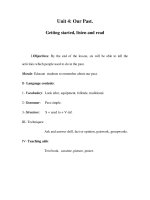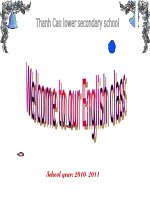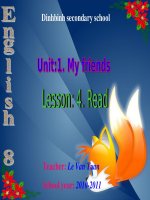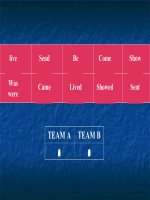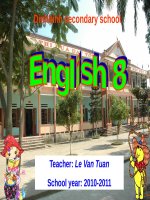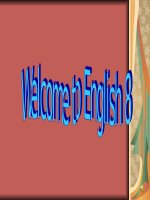slide bài giảng unit 04 our past lesson 1 listen and read
Bạn đang xem bản rút gọn của tài liệu. Xem và tải ngay bản đầy đủ của tài liệu tại đây (657.1 KB, 12 trang )
8/5
Unit 4:
Period 20 :
OUR PAST
Getting started + listen & read)
I. Getting started :
Look at the picture and write the names of the things that
do not belong to the past
I. Getting started :
The television
The radio
The mobile phone
The lighting fixture
The morden clothing
The school uniforms
II. Listen & read :
1.New words:
- ( to ) look after :
- equipment (n) :
- (a) folktale
:
- traditional (adj) :
- Great grandma :
Chăm sóc - ( to ) take care of :
Trang thiết bị
Câu chuyện dân gian
Truyền thống
Bà cố
2. Language notes :
I used to live on a farm when I was a young girl .
Meaning : đã từng ( thường ) làm gì
Form :
S + used to + infinitive .......
WHAT AND WHERE
Câu chuyện
folktale
dân gian
Looksóc
after
Chăm
Trang
equipment
thiết bị
traditional
Truyền
thống
Bà cố
Great-grandma
Listen and practice the dialogue with a partner
3.Ask and answer the questions:
a.Where did Nga’s grandmother use to live ?
She used to live on a farm .
b.Why didn’t she go to school ?
Because she had to stay home and help her mom .
c.What did Nga’s great - grandmother use to do?
She used to cook the meals, clean the house and wash the clothe
d.What did Nga’s great – grandmother and great – grandfather
do after dinner ?
She used to lit the lamp and he used to tell them stories .
e.What did Nga ask her grandmother to do at the end of the
conversation ?
She asked her grandmother to tell her the tale “ The lost shoe”
4.Fact or opinion ?Check () the boxes:
F O
a. I used to live on a farm.
b.There wasn’t any electricity.
c. Mom had to do everything without
the help of modern equipment.
d. My father used to tell us the stories.
e. The best one was The Lost Shoe.
f. Traditional stories are great.
HOMEWORK :
1.Learn vocab by heart .
2.Do part 2 again
3. Prepare for speaking.
Listen the story.Write the letter of the
most suitable moral lesson:
a, Don’t kill chickens.
b, Don’t be foolish what you have.
c, Be happy with what you have.
d, It’s difficult to find gold.
